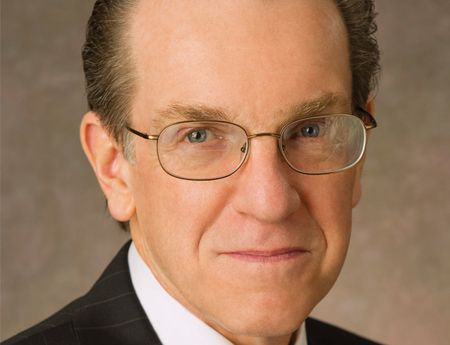David F. Poltrack

The smarter way to stay on top of broadcasting and cable industry. Sign up below
You are now subscribed
Your newsletter sign-up was successful
Related: Inductees Forge Individual Paths To Success
With his expansive intellect and boundless curiosity, David Poltrack could’ve thrived in any number of prestigious fields—science, perhaps, or law. Instead, the research whiz behind CBS’ boffo primetime performance committed his brilliance to broadcast television because, he says, nothing touches the people of America quite the way that medium does.
It’s the gravitas of news, the thrill of sports, the escape of entertainment. It’s, well, the entire universe…captured on the small screen. “The whole world passes through the spectrum of television,” Poltrack says. The daily interactions with people from the worlds of sports, news, entertainment and advertising, he adds, “makes it a much broader, far-reaching experience than a typical job in a typical place.”
Thriving networks are every bit a team effort, but Leslie Moonves, CBS Corp. president and CEO, heaps credit on his longtime chief research officer. “He’s undoubtedly the smartest research person who ever lived,” says Moonves, “in the history of television.”
Colleagues describe Poltrack as scary-smart, honorable, possessing a “delicious” sense of humor, and a tireless defender of the power of television. He’s also quick to call BS —at times literally—on those who say its future is anything but bright.
While his next birthday is his 70th, Poltrack has not lost a step. “People ask when I’ll retire,” he says. “I tell them, when I find something more fun to do.”
Poltrack grew up in a working-class neighborhood in Stamford, Conn. His father was an electrical engineer, working with transistors and semiconductors. His mother was so bright that she’d taught Greek and Latin in high school—while she was still in high school. She died when he was 14, saddling him with increased responsibility for his five younger siblings. “I can iron, cook, sew—I have all the domestic skills,” he says.
The smarter way to stay on top of broadcasting and cable industry. Sign up below
Poltrack also was a helper when his father would take apart washing machines, car engines or televisions, which was just about all the time. Alas, he did not pick up many pointers in the process. “To this day, my wife says, ‘How could you have grown up in that environment and not learned one practical mechanical skill?’” Poltrack says.
He attended Notre Dame and had a summer internship at a law firm that he once described as “the dullest thing you could ever imagine.” After graduating, Poltrack worked at an ad firm, until CBS, a major client for the agency, lured him on board in marketing at its owned stations in 1969. He shifted to research two years later, and has never looked back.
A CBS show’s success in prime is no accident. Perhaps more than any network, programs are tested, analyzed and reworked.
Ground zero for testing is a wholly Poltrack invention— CBS’ Television City at the MGM Grand in Las Vegas. While networks typically test on the coasts, Vegas is a true representation of people from all over America and all walks of life, reasons Poltrack.
Some 70,000 Sin City tourists have taken part in Television City testing—watching not only the new pilots on a range of devices, but new-show promos too. The latter helps CBS fi ne tune its marketing, and plants the seeds for upcoming shows in viewers ’ minds.
“It’s one of the most sophisticated and successful television research centers and it came out of the brain of David Poltrack,” says Moonves.
Across his four-and-a-half decades at CBS, Poltrack has emerged as eminence grise in the television research world, and a critical alderman in key industry organizations. Among other posts, he is past chairman of the Media Rating Council, is on the board at the Advertising Research Foundation , and chairs a vital committee at the Council for Research Excellence (CRE). CRE colleagues credit Poltrack for his integrity and honesty in furthering their mission.
“Every meeting is better for his attendance, because it will probably have a David Poltrack Moment that makes it so valuable,” says Richard Zackon, CRE facilitator. “He makes us all better researchers.”
One of the most memorable David Poltrack Moments was at an advertising association gathering in 2010, when Poltrack famously stood up and said that research on television’s diminishing might was “bullshit.” Even if they didn’t applaud, colleagues silently cheered.
“He’s not only a legend in the research sector, but the whole broadcast sector,” says Irwin Gotlieb, GroupM chairman and a B&C Hall of Famer. “He sorts through the bullshit in a remarkable way and tells it like it is.”
Gotlieb says too many industry figures “who should know better” are trumpeting the demise of television. “We need a few more like Poltrack,” he says, “someone out there [refuting that] publicly and unabashedly.”
Poltrack escapes from the workaday world through an array of water sports—sailing, swimming—with his wife Leslie, and also is a professor at the graduate schools of Columbia and New York University. He will continue to be among the most visible, along with Moonves, champions of broadcast television. And he’ll continue to find the gold buried in the research for as long as he’s enjoying the hit-making process.
Retirement can, most definitely, wait. “I don’t know what I’d do,” says Poltrack, “but sit around on a porch in Florida, waiting for the newspaper to come.”
Michael Malone is content director at B+C and Multichannel News. He joined B+C in 2005 and has covered network programming, including entertainment, news and sports on broadcast, cable and streaming; and local broadcast television, including writing the "Local News Close-Up" market profiles. He also hosted the podcasts "Busted Pilot" and "Series Business." His journalism has also appeared in The New York Times, The L.A. Times, The Boston Globe and New York magazine.

